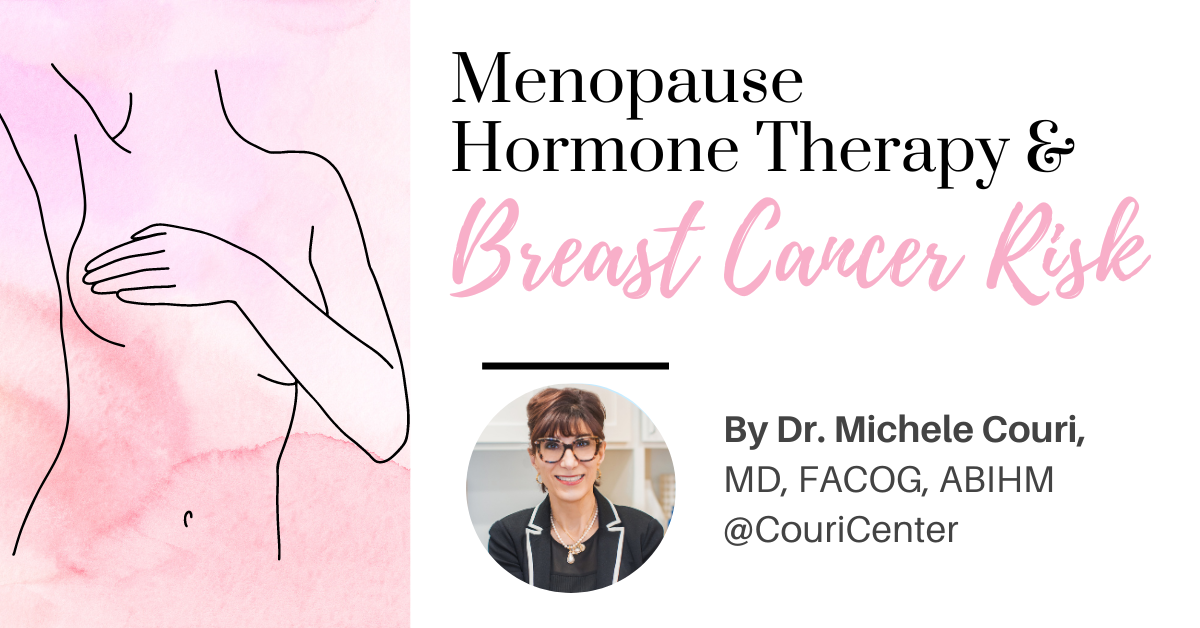
Many women ask me if menopause hormone therapy (MHT) increases the risk of breast cancer. Even though heart disease is the number one killer of women, breast cancer seems to be what women fear the most. I have summarized what I feel is the most relevant data to date about the link between hormone therapy and breast cancer. Beyond hormones, please remember that breast cancer risk is multifactorial including but not limited to the following factors: genetic inheritance, lifestyle, weight, diet, alcohol intake, and environmental exposures.
- The possible increased risk of breast cancer associated with MHT is small and estimated at less than 0.1% per year, or an incidence of <1.0 per 1,000 women per year of use. It is similar or lower than the increased risks associated with common lifestyle factors such as reduced physical activity, obesity, and alcohol consumption.
-
- Data from the WHI study demonstrated no increased risk in first-time users of MHT during the 5-7 years since initiation of treatment.
- The WHI study also demonstrated that 7.1 years of treatment with unopposed conjugated equine estrogen (CEE) decreased the risk of breast cancer diagnosis and mortality in hysterectomized women.
- The increased risk of breast cancer is primarily associated with the addition of a synthetic progestin to estrogen therapy and related to the duration of use.
- The risk may be lower with micronized progesterone (Prometrium) than with a synthetic progestin.
- The risk of breast cancer attributable to MHT is small and the risk decreases progressively after treatment is stopped.
- Breast cancer risk should be evaluated before MHT commences.
- A 2019 study in the journal Lancet (part of the Million Women Study) showed the following: For women of average weight in developed countries, 5 years of MHT, starting at age 50 years, would increase breast cancer incidence at ages 50-69 years by about
- One in every 50 users of estrogen plus daily progestagen
- One in every 200 users of estrogen only without progestagen
- The corresponding excesses from 10 years of MHT would be about twice as great.
- European Menopause Society 2020 Statement on MHT and breast cancer risk – No arbitrary limits should be placed on the dose or duration of usage of MHT. The risk of breast cancer with MHT should not be interpreted in isolation. This decision should be made on an individualized basis and considered in the context of the overall benefits obtained from using MHT, including symptom management and improved quality of life and the cardiovascular and bone protective effects associated with MHT.
- A 2019 study in the journal BMC Cancer, a 10 year study of over 1,200 women, showed no increased risk of invasive breast cancer in women on long term therapy of testosterone or testosterone/anastrozole pellet therapy.
We’re here to help. If you have questions regarding menopause hormone therapy and your breast cancer risk, schedule an appointment online via our patient portal or call 309-692-6838 today. New patients are always welcome.
To Your Health,
Dr. Couri
DISCLAIMER: The information provided on this website is intended for general informational purposes only and is not intended to be a substitute for professional medical advice, diagnosis, or treatment. The information provided is current as of the date of publication or last review, but medical knowledge is constantly evolving, and the information may become outdated over time.
Sources:
- European Menopause Society Roundtable: Dr. Antonina Smetnik. April 13, 2022.
- Collaborative Group on Hormonal Factors in Breast Cancer. Type and Timing of Menopausal Hormone Therapy and Breast Cancer Risk: Individual Participant Meta-Analysis of the Worldwide Epidemiological Evidence. The Lancet. Vol. 394. Issue 10204, p1159-1168. Sept, 2019.
- Glaser, R and Dimitrakakas, C. Incidence of Invasive Breast Cancer in Women Treated with Testosterone Implants: a Prospective 10-year Cohort Study. BMC Cancer. 2019. 19:1271.
